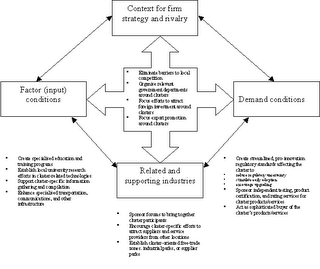Making Brunei Competitive
 An anonymous post on my entry Turning Brunei into a Nation of New Ideas noted that "... The Straits Times today (Sat 19 Aug) reported on the recent IPS-NTU report ranking economies on competitiveness. Out of 15 Asian economies, Brunei is in 14th place..."
An anonymous post on my entry Turning Brunei into a Nation of New Ideas noted that "... The Straits Times today (Sat 19 Aug) reported on the recent IPS-NTU report ranking economies on competitiveness. Out of 15 Asian economies, Brunei is in 14th place..."Competitiveness is a word much bandied about in Brunei nowadays. That anonymous entry certainly thinks that competitiveness is something we Bruneians should be aware of and he or she is right - we should. How does one become competitive?
For this article, I looked at 3 possible answers - the first from my own academic notes, the second from a study commissioned by Brunei Economic Development Board and the third from Asia-Inc, the magazine, which focused on a cross section study of our own Bruneians in various fields.
In one of my crazy moments when I was studying for my Masters, I cross registered to the tough Sloan School at MIT in USA. The main reason was actually to study under Professor Dornbusch who was a very famous economist who died in 2002. Anyway, the course was entitled 'Management and Policy in the International Economy' and I learnt a lot of things. The whole course was focused on the issue of how does a country get rich and how does it do quickly? I can't remember that much in the last 10 years but the last time I refered to my notes is that you can work out the competitiveness of a country by looking at several factors - the country's infrastructure (roads, legal, taxation, environment, stability etc); the country's macroenvironment (exchange rate and inflation stability and pro-growth climate); the country's labour and other factors (compensation levels, skill and motivation of workforce, capital markets, access to quality intermediates); and the country's output markets (size, composition, potential growth and competition).
Studies have also been undertaken in Brunei. One such study was the findings published by the Monitor Group who worked with the Brunei Economic Development Board and reported on RTB on 12th July 2003 to determine Brunei’s competitiveness on a global scale by reviewing key findings and recommendations of Foreign Direct Investments (FDI) initiative, as well as determining critical next steps to ensure successful implementation.
What were some of the key findings? Brunei ranks 69th out of 81 countries. It indicated that we should reexamine our complacent mindset. It highlighted the strengths of Brunei which include a stable and fair government, good standardized education system, robust oil and gas cluster and ample financial resources but our weaknesses are the underdeveloped business clusters, a poorly developed local private sector, lack of entrepreneurial culture and the slow government decision making. The finding also states that potential investors are very cautious about expansion or new investments, investors are either unfamiliar or unaware of investment prospects in Brunei. Brunei is perceived to be politically and socially stable, but possesses a low level of transparency and significant red tape. Furthermore, foreign organizations perceive Brunei to be biased towards investing internationally rather than domestically, which gives international investors lack of confidence.
The Group outlined four key strategic initiatives for Brunei to increase its competitiveness -
- Firstly targeting specific clusters - the 4 prioritized clusters are financial services, hospitality and tourism, business services and transportation and logistics;
- Secondly, building the Brunei brand: showcase the relative easiness to do business in Brunei. Build on the country’s safe and stable reputation and broadening the base of the economy;
- Thirdly, driving key policy reforms. The slow government decision-making process needs to reviewed, alongside the lack of transparency and the lack of recourse arising from potential disputes; and
- Finally empowering the public-private sector collaboration.
- Paula Malai Ali (you know who she is): Brunei should continue organising international events, like the first Brunei Marathon and the Asian Tour for golfers. As someone who is into arts and culture, I would like to see more music and arts festivals.
- Dr Pengiran Hishamuddin (a Fulbright scholar): I believe His Majesty’s Government has done a vast amount of work in this matter, for example by investing in education and human resource development. We need to unite together as a country and support the initiatives of His Majesty. Furthermore, we need to support and listen to each other, and have faith in the capabilities of our own people.Words of encouragement: Honesty and integrity are the keys to success. Have confidence and believe in your capabilities. We should also never forget that we are Bruneians with our own way of life, heritage, history, tradition and culture.
- Jonathan Chin (Isaac Newton Institute for Mathematical Sciences, Cambridge): Brunei is on the right track in trying to diversify its economy. The nation’s resources are really its people and I believe the answer lies in developing the talent of its people for the future.
- Laila Saleh (Engineer at Total now in Angola): What works in other countries does not necessarily work for Brunei. We have to pinpoint an economic niche for Brunei. I associate a country’s competitiveness with that of a company, and this brings us back to the essential: the development of personnel through a high-quality education system and innovation backed by new ideas and even better infrastucture. Privatisation works wonders for competitiveness if good and trustworthy managers are brought in.

Comments
Correct me if i'm wrong, but our efforts to achieve on Brunei's objectives, would lie in our ability to integrate and co-operate across all the relevant parties, be it public-private sector/ public-public sector/ private-private sector integration.
Where there are people, there will always be friction, but so long as it's relatively constructive we should be on the right direction, rite?
There are many intelligent people (Bruneians) out there (relative to our population), and i'm 100% sure the majority wants Brunei to continue to be peaceful and prosperous, and defnitely with the help of a diversified and competitive economy, away from the oil and gas sector. Personally, i pray that we can achieve this sooner than later cos i love this country!
P.s. if we go back the Monitor Group's 4 key points (whether we agree to it our not), let's look at which clusters have been growing since 2003. Let's understand what we've been doing right with those clusters, and analyse whether can these processes be replicated elsewhere.
Have a good extended weekend BR. You deserve it too!
Great post Mr. BR. God Bless.
why is it so difficult to cut that red tape anyway? & why is it hard to make even simple improvements work?
I mean... isn't the vast majority of the country's population already pretty much represented/ linked one way or the other with the government, i.e. they work for the government; they receive subsidies from the government; or alternatively own/or operate businesses linked to the government (receive contracts in govt projects or work in GLCs).
Hopefully the ideas keep coming in but then the hard part of executing the plans is down to every single person. Every person makes a difference to progress or hinder the strategy.
Here's another addition to the debate. Why is competitiveness important? One answer is Globalisation. We need to identify our strengths and weaknesses and develop a sustainable competitive advantage (not just open another restaurant because everyone else is doing it). With open markets and international barriers coming down (eg trade tarrifs, capital/job mobility), we need to be able to be competitive or we'll fall behind. We need to be attractive for talent, investment, trade etc.
1.Factor conditions – A nation’s position in factors of production such as skilled labour or the infrastructure necessary to compete in a given industry.
2.Demand conditions – the nature of home country demand for the industry’s product or service.
3.Related and supporting industries – the presence or absence of supplier industries and related industries that are internationally competitive.
4.Firm strategy, structure and rivalry – the conditions governing how companies are created, organised, and managed and the nature of domestic rivalry.
I would also like to share an article I came across on how to develop a marketing strategy for a country (Ireland). The challenge was to build Irish economy to match the affluence enjoyed by some of its Eurpoean neighboours. It was back in 1960s/1970s. At that time Ireland was viewed as being backward & unattractive for investment by international corporations.
The Irish govt realised that to attract investment from overseas it had to provide a stable economy, desirable resident suburbs, modern road & air-infrastructure, state of the art telecommunications and crucially, a well qualified, dynamic & motivated workforce.
Having improved the amenities, infrastructure and the workforce, the perceptions of the investors overseas had to be addressed. In order to instigate this change, the govt established a clear strategy by pinpointing attractive sectors for growth and actively encouraging growth businesses in those areas. Consumer products, electronics, healthcare & financial services were some of the key targets. Once decisions about growth priorities had been made, the aim was to develop a marketing programme based on the particular ASSETS that Ireland was able to offer. Among other things - the young, highly educated workforce, low corporate tax rates, excellent digital & satellite telecommunications systems & the stable currency with low inflation.Considerable care was taken to ensure that the propositions developed matched the requirements of the businesses targeted.
Today, industry accounts for 46% of GDP, while services accounts for 49% (estd.) and agriculture, of which Ireland traditionally rely on has fallen to 5% [source:www.theodora.com/wfb].
Back to the Porter's Diamond I mentioned above. Do we have all the four attributes that Porter contended. If yes, we can take a leaf of what Ireland is doing, or we may have been doing it already..
If some of the attributes are missing, how are we going to go about it.. so our country can shift its overreliance on oil.
It is not-the problem is that the status quo is hindering development, as the blog states. What we are doing is no substitute for what we should be doing, no matter how pleasing it is to Education officials to swallow and kidnap talented people and destroy their knowledge, Brunei needs people in proper places.
I never listen to that BS, I call it the 8 o clock BS because that's the itme it's usually on at RTB.